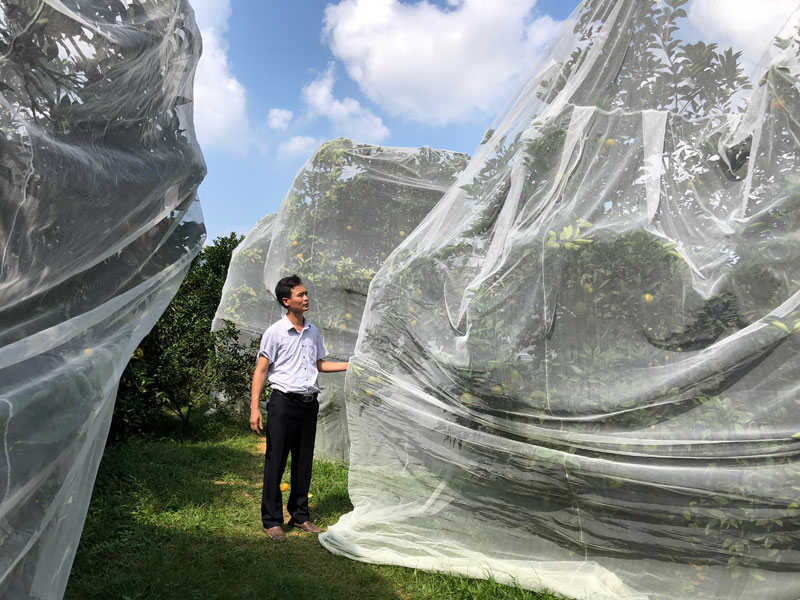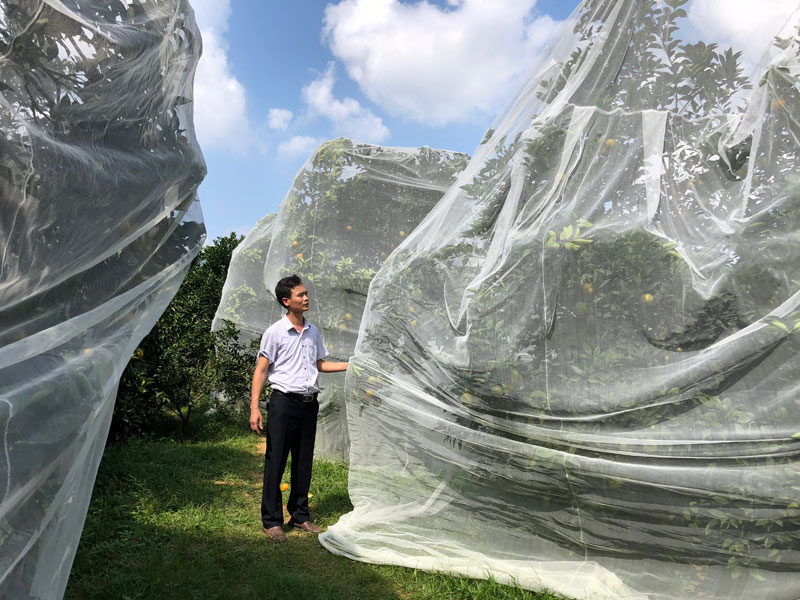
(HBO) - It is the idea of Mr. Duong Nhu Mung, in Mo gardening house, Binh Thanh commune (Cao Phong). He has conducted an experiment to spread the net for oranges in his garden since July to now. The result is better than expected: the quality of fresh fruits is better, the color is eye - catching, the fruit is all ripe and especially there is a limitation of the fruit falling condition which is common influences from insects and pests.

Mr. Duong Nhu Mung actualizes the idea of
protecting oranges from pests and insects by using net system.
Mr. Mung’s family has 11.5 hectares of citrus
fruit, mainly yellow oranges, V2 oranges, and Canh oranges. In order to have
the largest orange garden in Binh Thanh commune, he used up all his capital and
effort. About 6 hectares of oranges were in the business cycle time.
In particular, while thinking and finding new
things, Mr. Mung gave the idea of using the net for orange fruit, which derived
from his doubt that lying in the mosquito net can protect human from mosquitoes
or insects. Thus, if the net is spread for oranges, oranges will also be
protected to prevent the fruit from pests and insects. As he shared, the
harmful agents from the sweet fruit to harvesting time is not only the golden
flies but also the impact of autumn - winter climate with many frosty.
The initial cost was quite expensive, about
200,000 VND per plot per tree. However, he confidently said: In the process of
the experiment to use the net for protecting the orange area, the number of
yellow flies and magnets have been reduced thoroughly. The design and
durability of the net can be used from 3 to 5 years. Therefore, you can invest
in the first season but you can get the benefit at least for 3 years. The
insects, pests and diseases no longer have the chance to penetrate, causing
loss of quality and yield. In addition, when spreading the net to protect
oranges gets another important benefit, that is the gardeners do not need to
use pesticides, the isolation time with pesticides is absolute. Moreover, the net
can protect oranges and its appearances from the frost influence.
At present, Mr. Mung is testing of net
spreading for about 500 trees in an area of 1 hectare of VietGAP oranges trees.
According to data from the Hoa Binh Provincial Party Committee, the industrial production index for the first six months of 2025 is estimated to have increased by 20% compared to the same period last year. This marks the highest year-on-year growth rate for this period since 2020.
In the first six months of 2025, Hoa Binh province’s export turnover was estimated at 1.145 billion USD, marking an 18.11% increase compared to the same period in 2024. Import turnover was estimated at $ 804 million, a 17.15% increase, which helped the province maintain a positive trade balance.
The lives of the ethnic minority farmers in Tan Lac district have gradually improved thanks to the new directions in agricultural production. This is a testament to the collective strength fostered through the professional associations and groups implemented by various levels of the district’s Farmers’ Union.
With the motto the "product quality comes first,” after nearly one year of establishment and operation, Muong village’s Clean Food Agricultural and Commercial Cooperative, located in Cau Hamlet, Hung Son Commune (Kim Boi district), has launched reputable, high-quality agricultural products to the market that are well-received by consumers. The products such as Muong village’s pork sausage, salt-cured chicken, and salt-cured pork hocks have gradually carved out a place in the market and they are on the path to obtaining the OCOP certification.
In the past, the phrase "bumper harvest, rock-bottom prices" was a familiar refrain for Vietnamese farmers engaged in fragmented, small-scale agriculture. But today, a new spirit is emerging across rural areas of Hoa Binh province - one of collaboration, organisation, and collective economic models that provide a stable foundation for production.
Maintaining growing area codes and packing facility codes in accordance with regulations is a mandatory requirement for agricultural products to be eligible for export. Recently, the Department of Agriculture and Environment of Hoa Binh province has intensified technical supervision of designated farming areas and packing facilities to safeguard the "green passport" that enables its products to access international markets.



